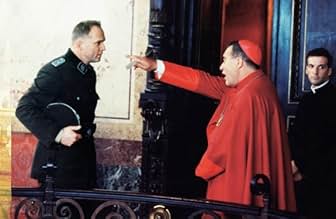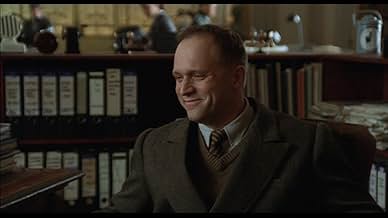Agrega una trama en tu idiomaDuring WWII SS officer Kurt Gerstein tries to inform Pope Pius XII about Jews being sent to extermination camps. Young Jesuit priest Riccardo Fontana helps him in the difficult mission to in... Leer todoDuring WWII SS officer Kurt Gerstein tries to inform Pope Pius XII about Jews being sent to extermination camps. Young Jesuit priest Riccardo Fontana helps him in the difficult mission to inform the world.During WWII SS officer Kurt Gerstein tries to inform Pope Pius XII about Jews being sent to extermination camps. Young Jesuit priest Riccardo Fontana helps him in the difficult mission to inform the world.
- Dirección
- Guionistas
- Elenco
- Premios
- 4 premios ganados y 9 nominaciones en total
- Dirección
- Guionistas
- Todo el elenco y el equipo
- Producción, taquilla y más en IMDbPro
Opiniones destacadas
Another perfect performance is given by the priest who tries to help the German officer. Mathieu Kassovitz (who also played the male leading role in 'Le Fabuleux destin d'Amélie Poulain')is very convincing in his role.
I think this movie is highly underrated. Costa-Gavras has made an important movie with 'Amen.' which looks at the holocaust-tragedy from another point of view which is seldom showed. The movie gives a true although unbelievable answer at one of the most important questions concerning the holocaust: didn't anyone saw this coming? Couldn't anyone prevent this from happening?
If you really want to know the answers to this questions, you certainly have to watch 'Amen.'. This movie should at least have an 8 and I'll give you two reasons why: one because the story is unique and magnificently told; and two because the two leading actors are giving the performance of a lifetime. Highly recommendable!
9/10
This is noticeably a continental European film, with brilliant direction and dazzlingly good acting, more Gosford Park than Schindler's List in terms of pace. Indeed, this slow pace only highlights the frustration felt by the two main characters as they are continually beaten down by the well-meaning leaders of their Churches.
Frustration, interestingly, is the only lasting emotion inspired in the viewer. Dr Germaine Greer attributed this, wrongly, I believe, to the fact that the film "doesn't seem to go anywhere", highlighting the leitmotiv frame of a so-called 'goods' train on its way to an unseen destination as a representation of this lack of direction. I would venture to suggest, though, that a conclusion is precisely what the director, the justly renowned Costa Garvas, was trying to avoid - he does not straightjacket his characters plainly as either heroes or villains and the film closes with the issues of morality it has raised left open-ended. It is meant to be thought provoking, not moving; the viewer is meant to conclude for himself what was morally correct and what was not.
At the end of the film, I found myself wondering which of the characters was most right - for none, it would seem, have a sole handle on the moral high-ground and there are arguments that promote each character's actions over another's. Whatever way you see this film and whatever conclusion you draw, it is a production which will not let you sleep easy until you have been challenged on many issues of morality.
The murder of his niece and the Jews appalls his Christian conscience. His wincing reaction whilst looking through the gas chamber spy-hole is well-acted. He alerts the Swedes and the Catholic Church, hoping that international pressure will awaken the German conscience. Catholic opposition has stopped the euthanasia programme and this can be mobilised to help the Jews.
In reality, Gerstein's options are limited. His own church leaders react mutely to his news of mass-murder. They caution restraint. Nazi indoctrination is trying to turn everyone into a rabid anti-Semite - as shown comically with Gerstein's youngest son giving annoying Hitler salutes. Most Protestants agree to join the new Nazi-sponsored 'Reich Church', happily reconciling faith with Nazism. Similarly, the 1933 Concordat with Hitler gave the Catholic Church a precarious protection as long as it stayed out of politics.
Carpet-bombing of German cities is killing women, children and babies. German forces are engaged in a titanic struggle against the 'forces of international Jewry ' - Russian Communism and American Capitalism. Facing this kind of mind-set and mass paranoia, the Jews needed a miracle. Saving mentally-handicapped members of German families is one thing. Saving a long-despised race thought to be the root cause of every world problem is very much another.
Gerstein's attempts to alert the Vatican are channelled through an invented character, a young Catholic priest who symbolises the conscience of thousands of individual Catholics who risked their lives to help Jews. He eventually sacrifices himself at Auschwitz, a Christ-like figure who 'redeems' his religion in the face of a terrible evil.
The controversial Pope Pius XII is portrayed in a curiously anodyne way - to the distaste of those who regard him as a Nazi sympathiser. The Vatican's fear of Communism, its efforts to hide Italian Jews and its self-preservation instinct in facing the Nazis are all clearly demonstrated. As is the help it gave to individual SS men on the run after the war. One is left to make up one's own mind about the Pope.
In truth, neither the Church nor the SS were monolithic organisations. Both were composed of individuals, good and bad. One reason for death factories was to save SS men from the horrors of mass-shootings. They offered a 'sanitised' method of killing, just as the 1933 Concordat offered a sanitised way for Nazism and Catholicism to relate to each other. Problems arose for individuals who had to make moral choices in carrying out these policies.
The controversial Roman lunch scene depicts the American ambassador discussing the fate of the Jews with Vatican big-wigs. Against a wonderful panoramic backdrop of the eternal city, they enjoy an excellent sea food meal. The American points out that finding an alternative home for millions of Jews would cause great problems. Nazi retaliation would only make things worse, counters a Vatican big-wig. A far cry from the cattle trucks rolling to and fro, emptying Europe of its Jews. This is a 'cheap shot' - decision-makers usually enjoy better material conditions than the rest of us. One can imagine Churchill discussing sensitive topics in a cold-blooded way over many a fine meal. It makes for good cinema, though!
This is an excellent film which covers a vast topic in 2 hours. It does not make judgements about Gerstein or the Christian churches. The Gerstein character is a complex one as is the Christian response to the Holocaust. It shows how difficult it is to 'buck the system' during wartime. Gerstein arrives at Auschwitz with the comforting knowledge that the allies 'never bomb the camps' - they know they are full of 'POW's'. Would prolonged bombing of the railways to the death camps have made a difference? Many Jews believe that this could and should have happened.
Should the allies have re-directed their military efforts to save Jews rather than merely fight the Nazis? Unfortunately, the 1930's and World War 2 had de-sensitised people to civilian suffering - newsreels from China, Abyssinia, Guernica; the Nazi bombing of Warsaw, Rotterdam, London, Coventry, the V1 and V2 attacks of 1944. World War I blurred the line between soldiers and civilians. World War 2 completely obliterated this distinction - on both sides of the conflict. Axis forces brought death to millions of Chinese and Russian civilians. The Allied bombing of Germany, Japan and northern France all produced heavy civilian casualties. Is there an essential difference between mass-bombing and the Holocaust?
European anti-Semitism aided the Holocaust. The miracle is that so many individual Gentiles did so much to aid Jews. Nazism put new ideas about human rights to the test. Governments and organisations may have been found wanting especially Vichy France. Individuals - including many brave Germans responded magnificently. This is the 'positive' side of the Holocaust which we should remember and treasure. Gerstein did his best to sabotage and stop the killing machine he became part of. The film allows us to make up our own minds about whether he and the Catholic Church did enough.
The pic is correctly based on historic deeds and famous personages as Pio XII and Nazi chiefs who don't appear in the film but they're continuously named as Goering , Goebbles , Himmler , Eichmann ,thus as notorious events as Stalingrado (1943) where Nazis have the first important defeat and the bombing strikes over the Germany cities (Berlin , Dresde) . The movie is based on a play by German playwright Rolf Hochhuth which started a lot of heated discussions and arguments after its first release in 1963. The film blends drama , tension , historical events and in spite of the runtime is two hours and some isn't boring , nor dreary but happens enough interesting deeds . The Vatican did not give a permission to shoot the film in their buildings. After searching a scenery of adequate size for the scenes taking place in the Vatican, Costa-Gavras finally chose Europe's largest building, the House of the People in Bucharest . Some of the outdoor scenes were shot in Mogosoaia Palace, some fourteen kilometers northwest of Bucharest. The movie attained quite polemic but there's an accusation to Catholic Church for passivity on the crimes and mass slaughter . I really think that didn't have but lack of forecast . The motion picture was well directed by Constantine Costa Gravas who at all his films always gets controversy and dispute . Rating : Above average . Well worth seeing .
¿Sabías que…?
- TriviaStefan Lux was a Jewish Czech journalist, who committed suicide in the general assembly room of the League of Nations during its session on July 3, 1936, to alert the world on the perils of German anti-Semitism. After shouting "C'est le dernier coup" ("This is the final blow") he shot himself with a revolver.
- ErroresIn one of the scenes they say that the Treblinka camp is out of gas, referring to Zyklon B. Treblinka didn't use Zyklon B, instead they used carbon monoxide.
- Citas
[first lines]
Stephan Lux: [interrupting a session of the Assembly of the League of Nations, Geneve, 1936] My name is Stephan Lux. I am Jewish. The Jews are being persecuted in Germany and the world doesn't care.
[He draws a pistol]
Stephan Lux: I see no other way to reach people's hearts.
[He shoots himself]
- ConexionesReferenced in Kaamelott: Amen (2005)
- Bandas sonorasThe Train I /II
Composed and arranged by Armand Amar
Orchestra:
Jean-Philippe Audin, Elsa Benabdallah, Igor Boranian, Fabien Boudot, Florent Bremond, Karen Brunon, Nathalie Carlucci, Hervé Cavellier, Emmanuel Gaugué, Thierry Köhl, Julien Leenhardt, Bobin Minalli Bella, Marthe Moinet, Yves Monciero, Philippe Morel, Amèlie Paradis, Emmanuel Raynaud, Alexandre Sauvaire
(P) & © 2002 Long Distance/France
Selecciones populares
- How long is Amen.?Con tecnología de Alexa
Detalles
- Fecha de lanzamiento
- Países de origen
- Sitios oficiales
- Idiomas
- También se conoce como
- Amen.
- Locaciones de filmación
- Productoras
- Ver más créditos de la compañía en IMDbPro
Taquilla
- Presupuesto
- FRF 103,000,000 (estimado)
- Total en EE. UU. y Canadá
- USD 274,299
- Fin de semana de estreno en EE. UU. y Canadá
- USD 16,284
- 26 ene 2003
- Total a nivel mundial
- USD 8,419,052
- Tiempo de ejecución2 horas 12 minutos
- Color
- Mezcla de sonido
- Relación de aspecto
- 1.85 : 1
Contribuir a esta página


































